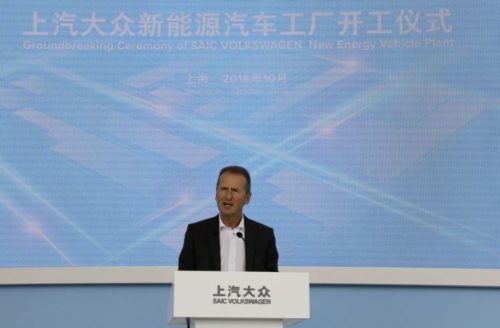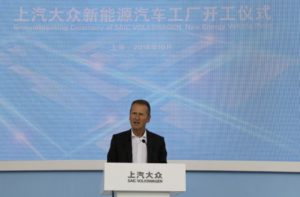Press Release: Volkswagen boss Claims to Know Nothing of ‘re-education’ camps in China: Volkswagen violates its own principles and loses credibility

Press Release – For immediate release
17 April 2019
Contact: World Uyghur Congress www.uyghurcongress.org
0049 (0) 89 5432 1999 or [email protected]
 The Society for Threatened Peoples (STP) and the World Uyghur Congress (WUC) accuse Volkswagen AG of forfeiting its credibility. Yesterday in an interview, the company’s CEO, Herbert Diess, told a BBC broadcaster that he knew nothing about “re-education” camps in China, where 1.5 million Uyghurs and Kazakhs are interned. “Who sells every second car in the People’s Republic and has a board member only for the China business cannot credibly claim to know nothing of the infamous camps,” explained Ulrich Delius, Director of STP.
The Society for Threatened Peoples (STP) and the World Uyghur Congress (WUC) accuse Volkswagen AG of forfeiting its credibility. Yesterday in an interview, the company’s CEO, Herbert Diess, told a BBC broadcaster that he knew nothing about “re-education” camps in China, where 1.5 million Uyghurs and Kazakhs are interned. “Who sells every second car in the People’s Republic and has a board member only for the China business cannot credibly claim to know nothing of the infamous camps,” explained Ulrich Delius, Director of STP.
Since the summer of 2018, German and international media have reported on the notorious camps. “Every Uyghur family misses relatives who have been deported to camps. Volkswagen operates its own factory in the homeland of the Uighurs. The crimes of the authorities there cannot have escaped the leadership of the group,” said Dolkun Isa, WUC President.
The human rights organizations remind Volkswagen leadership of their own corporate principles, which they reveal with their silence to the camps. The Volkswagen AG Code of Conduct, signed by Herbert Diess alongside other VW managers, explicitly sets out the respect for internationally recognized human rights and the support for respecting these rights. “These self-imposed principles do not seem to matter much if the corporate leadership so openly ignores them,” said Delius.
At the Shanghai Auto Show, Volkswagen only yesterday reaffirmed an ever greater focus on the Chinese car market. However, the growing dependence of the Group on the Chinese sales market in is causing more and more problems. “For a long time, Chinese business has been a model of success for Volkswagen. Meanwhile, the risks associated with dependency are growing: the company is becoming susceptible to blackmail, preferring to ignore serious human rights violations so as not to upset the Chinese leadership,” said Delius.
Together with a Chinese partner, Volkswagen maintains a plant in Urumqi, the capital of the Uyghur region, which houses hundreds of camps. Management had opposed the targeted promotion of Uyghurs who were particularly disadvantaged in the labor market in this factory.

